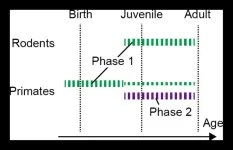(Press-News.org) Younger women are generally thought to have a low risk of heart disease, but new research urges clinicians to revisit that assumption, especially for women who suffer from certain mental health conditions. A new study being presented at the American College of Cardiology’s Annual Scientific Session found that having anxiety or depression could accelerate the development of cardiovascular risk factors among young and middle-aged women.
The study draws new attention to the importance of cardiovascular screening and preventive care as rates of cardiovascular risk factors rise and heart attacks become more common in younger people. Anxiety and depression have also become more prevalent in recent years, especially since the COVID-19 pandemic.
The researchers reported that younger women with anxiety or depression were nearly twice as likely to develop high blood pressure, high cholesterol or diabetes over a 10-year period compared with women who did not have these mental health conditions, putting them nearly on par with men of the same age in terms of heart disease risk.
“We often feel that young women are the ‘safe group’ with regards to cardiovascular disease because the incidence of cardiovascular disease is quite low due to the protective effects of estrogen in this group,” said Giovanni Civieri, MD, cardiologist, research fellow at Massachusetts General Hospital and Harvard Medical School, doctoral student at the University of Padua in Italy and the study’s lead author. “But this study suggests that if a younger woman has depression or anxiety, we should start screening for cardiovascular risk factors to reduce the incidence of cardiovascular disease.”
The researchers analyzed health records of 71,214 people participating in the Mass General Brigham Biobank, a research program of the Mass General Brigham health system. People who had heart disease or who were diagnosed with anxiety or depression after the study began were excluded.
During the 10-year follow-up period, 38% of participants developed high blood pressure, high cholesterol and/or diabetes. According to the analysis, those with a history of anxiety or depression before the study period were about 55% more likely to develop one or more of these risk factors than people without anxiety or depression. This finding was most pronounced among women under the age of 50 with anxiety or depression, who were nearly twice as likely to develop cardiovascular risk factors compared with any other group.
In terms of absolute risk, young women overall showed the lowest rates of cardiovascular risk factors of any group, which was expected based on findings from previous studies and what is known about the protective effects of estrogen in pre-menopausal women. However, anxiety and depression were associated with a much higher relative risk among young women than was seen in other groups.
“Once a young woman has depression or anxiety, her absolute risk is comparable to a young male,” Civieri said. “There is a sort of a catch-up phenomenon where depression and anxiety increase the risk that would otherwise be very low.”
To study the potential drivers behind this relationship, the researchers examined the metabolic activity of stress-related brain regions in a subset of participants who had undergone brain scans. The results indicated that younger women with anxiety or depression showed relatively large increases in stress-related neural activity.
“The question is: Why are anxiety and depression associated with heightened gains in risk among younger females? This is something we are continuing to study,” Civieri said.
Although anxiety and depression are separate conditions, they were grouped together in the study because they are both associated with increased cardiovascular risk and they share common neurobiological pathways, meaning they are thought to affect health in similar ways.
It is unknown whether mental health treatments, such as antidepressant medications or psychotherapy, could help reduce cardiovascular risk, researchers said. However, once a person has high blood pressure, high cholesterol or diabetes, Civieri said that well-established treatments such as statins and blood pressure-lowering drugs can effectively reduce the risk of serious cardiac events.
Civieri will present the study, “Anxiety and Depression Increase Cardiovascular Disease Risk by Accelerating the Development of Risk Factors: Effects of Age and Sex,” on Saturday, April 6, 2024, at 3:45 p.m. ET / 19:45 UTC in Hall B4-5.
ACC.24 will take place April 6-8, 2024, in Atlanta, bringing together cardiologists and cardiovascular specialists from around the world to share the newest discoveries in treatment and prevention. Follow @ACCinTouch, @ACCMediaCenter and #ACC24 for the latest news from the meeting.
The American College of Cardiology (ACC) is the global leader in transforming cardiovascular care and improving heart health for all. As the preeminent source of professional medical education for the entire cardiovascular care team since 1949, ACC credentials cardiovascular professionals in over 140 countries who meet stringent qualifications and leads in the formation of health policy, standards and guidelines. Through its world-renowned family of JACC Journals, NCDR registries, ACC Accreditation Services, global network of Member Sections, CardioSmart patient resources and more, the College is committed to ensuring a world where science, knowledge and innovation optimize patient care and outcomes. Learn more at ACC.org.
###
END
Automated external defibrillators (AEDs) are a common resource in public buildings, yet a new analysis reveals that they are rarely used to help resuscitate people suffering cardiac arrest. Research, which will be presented at the American College of Cardiology’s Annual Scientific Session, found that AEDs were only used in 13 of nearly 1,800 cases of out-of-hospital cardiac arrest, even though many of the incidents occurred near a public AED.
Cardiac arrest occurs when the heart suddenly stops beating. It is different from a heart attack, which is when a blockage prevents blood ...
Whether you like your eggs sunny-side up, hard boiled or scrambled, many hesitate to eat them amid concerns that eggs may raise cholesterol levels and be bad for heart health. However, results from a prospective, controlled trial presented at the American College of Cardiology’s Annual Scientific Session show that over a four-month period cholesterol levels were similar among people who ate fortified eggs most days of the week compared with those who didn’t eat eggs.
A total of 140 patients with or at high risk for cardiovascular disease were enrolled in ...
Young to middle-aged women who reported drinking eight or more alcoholic beverages per week—more than one per day, on average—were significantly more likely to develop coronary heart disease compared with those who drank less, finds a study presented at the American College of Cardiology’s Annual Scientific Session. The risk was highest among both men and women who reported heavy episodic drinking, or “binge” drinking, and the link between alcohol and heart disease appears to be especially strong among women, according to the findings.
The study focused on 18- to 65-year-old ...
The Texas Tech University Health Sciences Center (TTUHSC) School of Nursing announced March 27 the establishment of the TTUHSC Center for Nursing Research, Collaboration and Innovation.
“Interprofessional collaboration is essential for advancing research in health care,” TTUHSC School of Nursing Dean and Professor Holly Wei, Ph.D., said. “By bringing together professionals from various disciplines, we can harness a wide range of perspectives and skills to develop innovative solutions that significantly impact patient care and outcomes.”
For years, the TTUHSC School of Nursing has been recognized for its ability to educate ...
How much fuel can we add to the fire while still maintaining control?
Metaphorically speaking, that’s the question one team at the U.S. Department of Energy’s Princeton Plasma Physics Laboratory (PPPL) has been asking themselves lately.
Now, they believe they have the answer for one particular scenario. It’s all a part of the Lab’s work to bring energy from fusion to the power grid.
Building upon recent findings showing the promise of coating the inner surface of the vessel containing a fusion plasma in liquid lithium, the researchers have determined the maximum density of uncharged, or neutral, particles at the edge of a plasma before the edge ...
A healthy gut plays an indispensable role in the absorption and metabolism of nutrients, maintaining immune function, and promoting general well-being. The profound impact of a healthy microbiome is not just limited to the gut, but there is mounting evidence that it influences almost every function of the body. Thus, the composition of the gut microbiome becomes an important indicator of health status of the body.
Probiotics are a type of supplements containing live strains of bacteria that improve and diversify the gut microbiome population. Lactiplantibacillus plantarum, a type of microorganism ...
In many chemical-related industries, such as pharmaceuticals, oil refineries, and food and beverage factories, separating organic liquid mixtures is an essential step. A staple method to achieve this is distillation, which involves heating a mixture to a specific temperature so that only one of its components vaporizes. Though widely used, distillation fails to separate organic liquid mixtures in which both components have the same boiling point. Moreover, it’s an energy- and resource-intensive process, ...
BALTIMORE, March 27, 2024— Researchers at Kennedy Krieger Institute and Johns Hopkins Medicine have developed a new, accessible approach to analyze a patient’s walking ability and stances more effectively. Following numerous tests, they determined that a simple video recorded on a personal pocket device, such as a smartphone or tablet, can be used to measure gait at a clinical, high-quality level.
Experts say current state-of-the-art approaches to gait analysis are often expensive and inaccessible due ...
A new study led by Michigan State University researcher Peter Williams sheds light on the profound influence of deep geographic isolation on the evolution of mammals. Published in Nature Communications on March 28, the research reveals how long-lasting separation between continents has shaped distinct mammal communities around the globe.
“Today’s ecology was not inevitable. If there were different isolating factors long ago, we might have vastly different ecosystems today,” said Peter Williams, the lead author of the study. Williams is a research ...
The first analysis of how synaptic proteins change during early development reveals differences between mice and marmosets but also what's different in individuals with autism spectrum disorders. The Kobe University findings offer first insights into the mechanism behind synaptic development and open up routes for research on possible treatments.
Given that synapses are the connections between our brain cells, one might think that having as many of these as possible is a good thing. However, primate brains do something unexpected: After early childhood, ...






